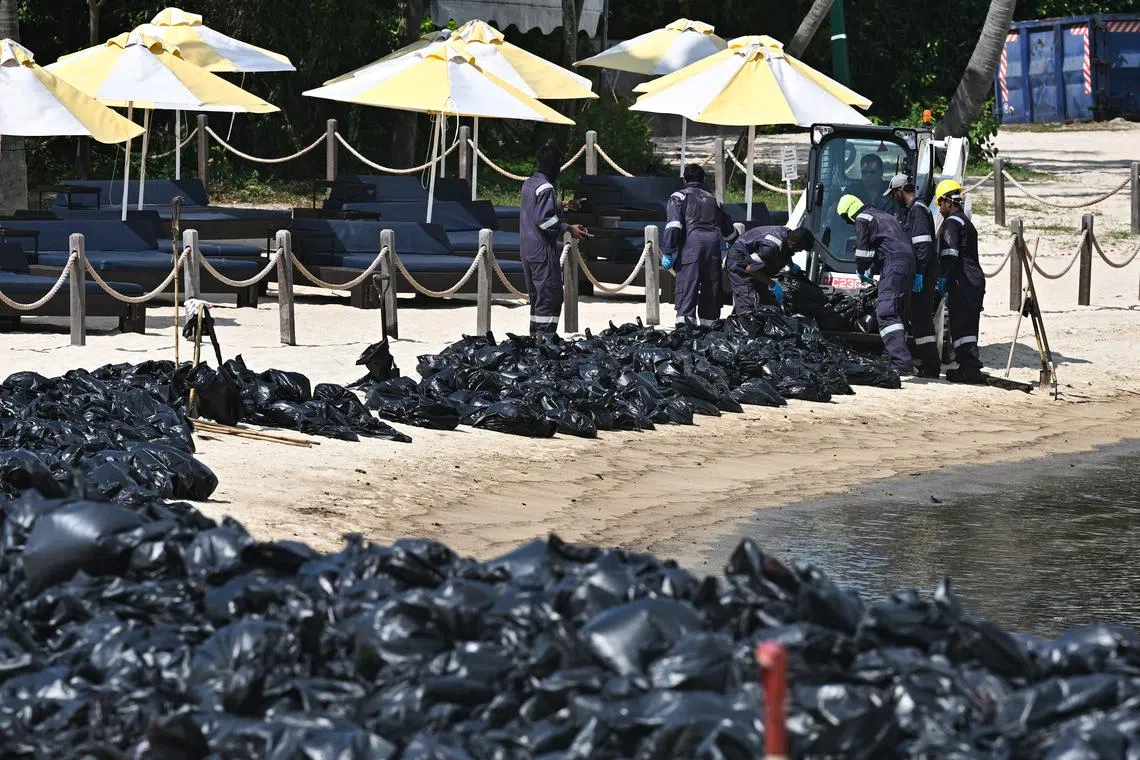60 compensation claims lodged by those affected by June oil spill in S’pore waters
Sign up now: Get ST's newsletters delivered to your inbox

Workers removing bags of oil-stained sand on Tanjong Beach in Sentosa on June 25.
ST PHOTO: LIM YAOHUI
SINGAPORE – Three months after an oil spill stained Singapore’s coastlines, the International Oil Pollution Compensation (IOPC) Funds have received around 60 claims for the damage caused by the incident.
The international compensation scheme was unable to reveal the value of the claims, as they are still under assessment.
Singapore is a member of the IOPC Funds, which are two intergovernmental organisations that provide financial compensation for oil pollution arising from tanker oil spills in member states.
Speaking to The Straits Times on Sept 17 during a visit to Singapore, IOPC Funds director Gaute Sivertsen said he does not expect the total projected value of claims against the funds for this incident to exceed their limit of $355 million, based on discussions with various stakeholders that intend to file claims.
The funds noted that it is “impossible” to estimate the total value of claims at this stage due to the multiple variables at play.
There is an $8 million limit to the claims that can be made against the insurer of Marine Honour, the bunker vessel that spilled oil into Singapore’s waters
The 1992 Fund, established by the IOPC Funds, includes pooled resources from parties involved in oil trading that receive certain types of oil via sea transport.
Mr Sivertsen said that the governing bodies of the IOPC Funds will meet in London in the first week of November to discuss compensation for the incident, and payments will be made to valid claimants after the go-ahead has been given by the 1992 Fund executive committee.
This is one of the two or three annual meetings between the governing bodies of the funds.
On June 14, Netherlands-flagged Vox Maxima suffered a sudden loss of engine and steering control and hit Singapore-flagged Marine Honour, causing 400 tonnes of oil to leak into the sea near Pasir Panjang Terminal.
IOPC Funds claims manager Ali Kielany said the 60 claims submitted were mostly from Marine Honour’s insurer, British Marine, which arranged for the first part of the oil spill clean-up operations immediately after the incident, as well as private individuals who suffered damage to their yachts and docks.
Mr Sivertsen noted that to date, the Maritime and Port Authority of Singapore (MPA) and other state agencies have not filed their claims against the IOPC Funds for the subsequent clean-up operations.
The National Parks Board, National Environment Agency and Sentosa Development Corporation were also involved in the clean-up efforts.
Asked when MPA will submit its claims to the IOPC Funds, the authority told ST on Sept 18 that the government agencies are in the process of consolidating the related costs for the assessment of claims.

IOPC Funds director Gaute Sivertsen said he does not expect the total projected value of claims against the IOPC funds for the oil spill incident in June to exceed their limit of $355 million.
ST PHOTO: GIN TAY
Citing past overseas cases where significant time was needed to collect documents and calculate costs, Mr Sivertsen said most claims made by governments could take more than a year to be submitted to IOPC Funds.
While IOPC Funds started receiving claim submissions for this incident from August, Mr Sivertsen said the organisations expect most claims to be presented within the next few months from parties such as owners of businesses along the beaches, individual yacht owners and marinas.
The clean-up of public spaces affected by the oil spill was completed on Sept 3, said MPA. However, high-contact water activities are still prohibited on East Coast Park’s beaches.
Affected parties need to submit their claims within three years from the date that the damage occurred, and within six years from the date of the incident.
On when claimants can receive compensation, Mr Sivertsen said it depends on how soon the claims are submitted and how well documented they are.
Based on claims for other incidents, it could range from less than a month to several years – if the case goes to court – from the submission date.
He noted that filing claims against the IOPC Funds should be a “straightforward process” in Singapore, as there is a “paper trail” where evidence is well documented, which translates to quicker assessment and settlement processes.
Additionally, Mr Sivertsen said that claims have to be “reasonable” as IOPC Funds do not pay for the “betterment” of affected parties, but instead aim only to reinstate them to their original state.
For example, IOPC Funds would refund fishermen for the damage caused to their fishing gear, but would also take into account the age and condition of their equipment before the incident occurred.
In incidents where the total value of the claims exceeds the IOPC Funds’ limit of $355 million, payments for all claims are prorated at a fixed percentage across the board.
Mr Sivertsen said IOPC Funds will assess whether they will compensate claimants for this incident in full after the meeting between the scheme’s governing bodies in November.
IOPC Funds will pay for the costs related to the incident and want “to provide assurance that the damage suffered from the oil spill will be compensated by this system”, he added.


